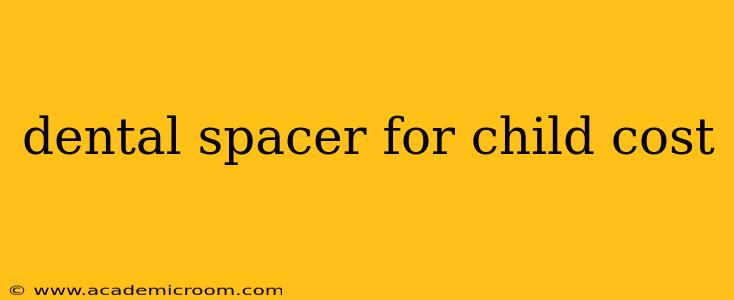Dental spacers are small devices used in pediatric dentistry to create space for permanent teeth to erupt correctly. They're often necessary when baby teeth are lost prematurely or when there's insufficient space for the incoming adult teeth. The cost of a dental spacer for a child varies significantly depending on several factors, making it crucial to understand what influences the final price. Let's delve into the details.
What is the Average Cost of a Dental Spacer for a Child?
Unfortunately, there's no single answer to this question. The cost of a child's dental spacer can range considerably, typically falling between $50 and $500 per spacer. Several factors contribute to this wide price range:
Factors Affecting the Cost of a Dental Spacer:
- Type of Spacer: Different types of spacers exist, each with varying materials and complexity. Simple spacers are generally less expensive than more complex ones.
- Number of Spacers Needed: Multiple spacers might be required depending on the child's specific needs.
- Dentist's Fees: Dentists' fees vary based on location, experience, and practice overhead. A specialist orthodontist will generally charge more than a general dentist.
- Insurance Coverage: Dental insurance plans can significantly impact the out-of-pocket cost. Some plans cover a portion or all of the cost, while others offer minimal or no coverage.
- Additional Procedures: Sometimes, the placement of a spacer requires additional procedures, such as X-rays or other diagnostic tests, which add to the overall expense.
What Types of Dental Spacers are Available?
Several types of dental spacers are used, each designed to address specific needs:
- Band-and-Loop Spacers: These utilize a metal band cemented to a tooth, connected to a loop that holds the spacer in place.
- Fixed Spacers: These are bonded directly to the teeth and are often made of metal or plastic.
- Removable Spacers: These are typically easier for children to clean, as they can be removed. However, they also require more diligence from the patient and may be less effective in certain situations.
How Long Does a Child Need to Wear a Dental Spacer?
The duration a child needs to wear a dental spacer depends on the individual case. It can range from a few months to a year or more. Your orthodontist or dentist will determine the necessary timeframe based on the child's progress and the specific needs of their teeth alignment.
What are the Alternatives to Using Dental Spacers?
In some cases, alternatives to dental spacers may be considered, though these are often less common. Your dentist can discuss options such as early extraction of baby teeth, but this is usually only if the teeth are severely impacted or have other issues.
Does Dental Insurance Cover the Cost of Dental Spacers?
Dental insurance coverage for dental spacers varies widely depending on your specific plan. Some plans cover a significant portion of the cost, while others may offer minimal or no coverage. It's crucial to review your insurance policy carefully or contact your insurance provider to understand your coverage.
What Happens if a Child Doesn't Get a Dental Spacer?
If sufficient space isn't created for permanent teeth to erupt, overcrowding can occur. This might necessitate more extensive and potentially costly orthodontic treatment later in life, such as braces.
My Child Needs a Spacer; What Should I Do Next?
Scheduling a consultation with your child's dentist or orthodontist is the first crucial step. They will assess your child's teeth and determine whether a spacer is necessary and what type would be most suitable. During the consultation, they will also discuss the associated costs and payment options, helping you prepare for the procedure.
This information provides a general overview. Always consult with a qualified dental professional for personalized advice and treatment options for your child. Remember that proactive dental care can often save money and prevent more complex issues in the future.
